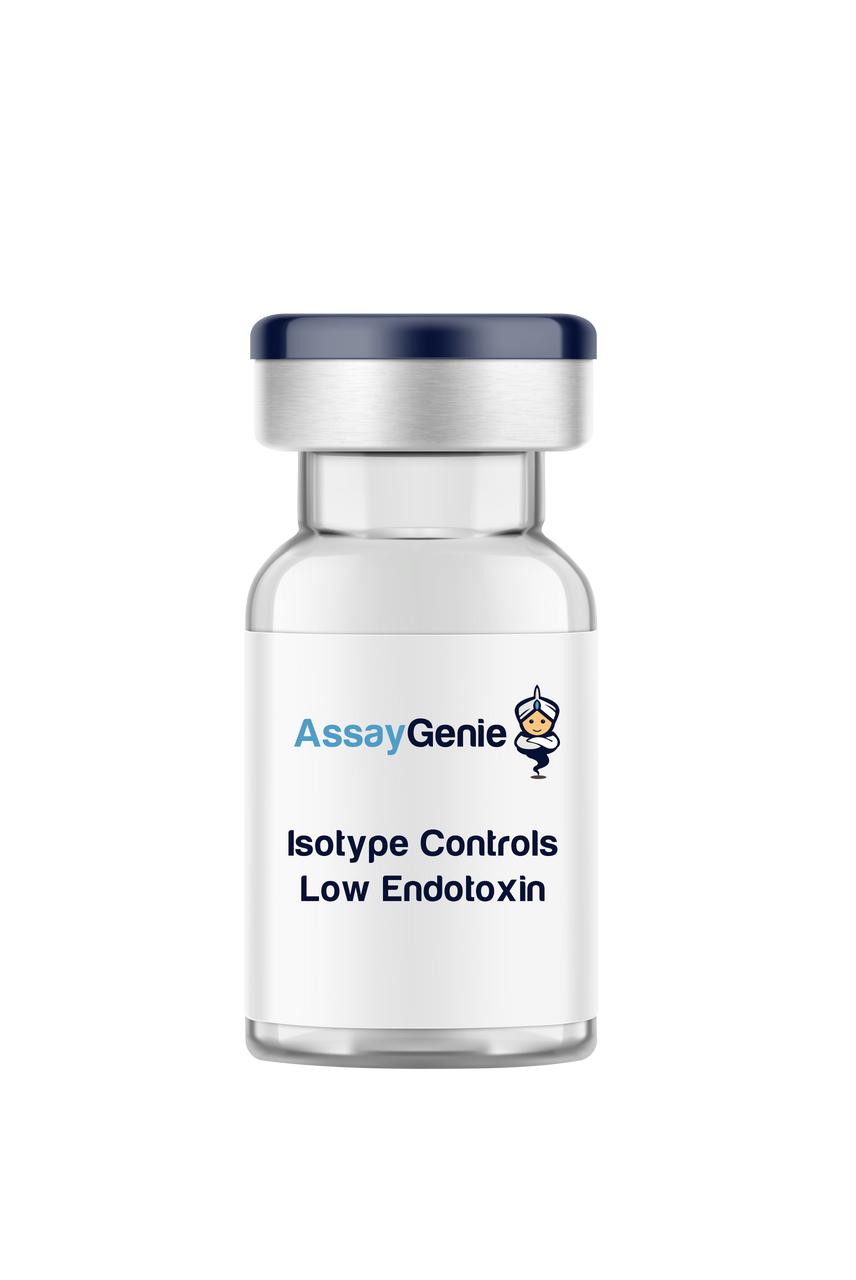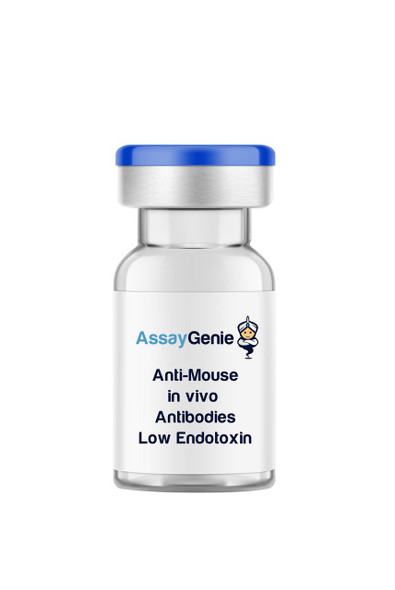Anti-Mouse/Human PD-L2 (CD273) In Vivo Antibody - Low Endotoxin (IVMB0116)
- SKU:
- IVMB0116
- Antibody Type:
- Functional-Grade In Vivo Antibody
- Applications:
- In Vivo
- Disease Area:
- Cancer
- Clone:
- 3.2.B8
- Protein:
- PD-L2
- Isotype:
- Mouse IgG1
- Reactivity:
- Mouse
- Human
- Synonyms:
- B7-DC
- CD273
- PDL2
- B7DC
- Clone 3.2
- Research Area:
- Immune Checkpoint & Cancer Biology
- Endotoxin Level:
- Low Endotoxin
- Host Species:
- Mouse
- Blocking
- FC
Description
Anti-Mouse/Human PD-L2 (CD273) In Vivo Antibody - Low Endotoxin
Introducing the Anti-Mouse/Human PD-L2 (CD273) In Vivo Antibody - Low Endotoxin from Assay Genie, a highly specific monoclonal antibody tailored for in vivo applications. This antibody targets the PD-L2 (CD273) protein, which plays a pivotal role in the regulation of immune responses, making it ideal for immunological research and related fields. With a rat IgG2a isotype, it ensures high purity and low endotoxin levels (<0.1 EU/μg), making it perfect for applications such as ELISA, flow cytometry, functional assays, blocking studies, and in vivo depletion. Available in various sizes, it is formulated in sterile phosphate-buffered saline for optimal stability and efficacy.
Elevate your research endeavors with this dependable and versatile antibody. PD-L2 (CD273) is a member of the B7 family and is primarily expressed on dendritic cells and various tumor cells. It interacts with the PD-1 receptor on T-cells, playing a crucial role in the negative regulation of T-cell activation and tolerance. This interaction is essential for maintaining immune homeostasis and can be exploited by tumors to evade immune surveillance. The Anti-Mouse/Human PD-L2 antibody is invaluable for studying immune regulation, cancer immunotherapy, and the mechanisms of immune checkpoint inhibition.
| Product Name: | Anti-Mouse/Human PD-L2 (CD273) In Vivo Antibody - Low Endotoxin |
| Product Code: | IVMB0116 |
| Size: | 1mg, 5mg, 25mg, 50mg, 100mg |
| Clone: | 3.2.B8 |
| Protein: | PD-L2 |
| Product Type: | Monoclonal Antibody |
| Synonyms: | B7-DC, CD273, PDL2, B7DC, Clone 3.2 |
| Isotype: | Mouse IgG1 |
| Reactivity: | Mouse/Human |
| Immunogen: | Made in PD-L2 knockout mouse fusion partner X63-Ag8.653 myeloma cells |
| Applications: | B, FC |
| Formulation: | This monoclonal antibody is aseptically packaged and formulated in 0.01 M phosphate buffered saline (150 mM NaCl) PBS pH 7.2 - 7.4 with no carrier protein, potassium, calcium or preservatives added. |
| Endotoxin Level: | < 1.0 EU/mg as determined by the LAL method |
| Purity: | ≥95% monomer by analytical SEC >95% by SDS Page |
| Preparation: | Functional grade preclinical antibodies are manufactured in an animal free facility using only In vitro protein free cell culture techniques and are purified by a multi-step process including the use of protein A or G to assure extremely low levels of endotoxins, leachable protein A or aggregates. |
| Storage and Handling: | Functional grade preclinical antibodies may be stored sterile as received at 2-8°C for up to one month. For longer term storage, aseptically aliquot in working volumes without diluting and store at -80°C. Avoid Repeated Freeze Thaw Cycles. |
| Applications: | B, FC |
| Recommended Usage: | WB For Western blotting, the suggested use of this reagent is 10 µg per ml (See Data Results) Each investigator should determine their own optimal working dilution for specific applications. See directions on lot specific datasheets, as information may periodically change. |
| Reactivity: | Mouse/Human |
| Host Species: | Mouse |
| Specificity: | Clone 3.2.B8 recognizes an epitope on mouse/human PD-L2 and has been shown to bind to both mouse and human PD-L2 equally well |
| Antigen Distribution: | PD-L2 is expressed on dendritic cells, liver, few transformed cell lines, and a subset of macrophages. |
| Immunogen: | Made in PD-L2 knockout mouse fusion partner X63-Ag8.653 myeloma cells |
| Concentration: | ≥ 5.0 mg/ml |
| Endotoxin Level: | < 1.0 EU/mg as determined by the LAL method |
| Purity: | ≥95% monomer by analytical SEC >95% by SDS Page |
| Formulation: | This monoclonal antibody is aseptically packaged and formulated in 0.01 M phosphate buffered saline (150 mM NaCl) PBS pH 7.2 - 7.4 with no carrier protein, potassium, calcium or preservatives added. |
| Preparation: | Functional grade preclinical antibodies are manufactured in an animal free facility using only In vitro protein free cell culture techniques and are purified by a multi-step process including the use of protein A or G to assure extremely low levels of endotoxins, leachable protein A or aggregates. |
| Storage and Handling: | Functional grade preclinical antibodies may be stored sterile as received at 2-8°C for up to one month. For longer term storage, aseptically aliquot in working volumes without diluting and store at -80°C. Avoid Repeated Freeze Thaw Cycles. |
PD-1 is a 50-55 kD member of the B7 Ig superfamily. PD-1 is also a member of the extended CD28/CTLA-4 family of T cell regulators and is suspected to play a role in lymphocyte clonal selection and peripheral tolerance. The ligands of PD-1 are PD-L1 and PD-L2, and are also members of the B7 Ig superfamily. PD-1 and its ligands negatively regulate immune responses. PD-L1, or B7-Homolog 1, is a 40 kD type I transmembrane protein that has been reported to costimulate T cell growth and cytokine production. The interaction of PD-1 with its ligand PD-L1 is critical in the inhibition of T cell responses that include T cell proliferation and cytokine production. PD-L1 has increased expression in several cancers. Inhibition of the interaction between PD-1 and PD-L1 can serve as an immune checkpoint blockade by improving T-cell responses In vitro and mediating preclinical antitumor activity. Within the field of checkpoint inhibition, combination therapy using anti-PD1 in conjunction with anti-CTLA4 has significant therapeutic potential for tumor treatments. PD-L2 is a 25 kD type I transmembrane ligand of PD-1. Via PD-1, PD-L2 can serve as a co-inhibitor of T cell functions. Regulation of T cell responses, including enhanced T cell proliferation and cytokine production, can result from mAbs that block the PD-L2 and PD-1 interaction.
| Technical Datasheet: | View |
| Protein: | PD-L2 |
| Function: | Binds to PD-1 and alternative receptor; |
| Ligand/Receptor: | PD-1, uncharacterized receptor |
| Research Area: | Costimulatory Molecules, Immunology |

| Mouse IgG1 Isotype Control [HKSP] | |
|---|---|
| Clone | HKSP |
| Isotype | Mouse IgG1 |
| Endotoxin Level | Low Endotoxin |

| Mouse IgG1 Isotype Control [HKSP84] | |
|---|---|
| Clone | HKSP84 |
| Isotype | Mouse IgG1 |
| Endotoxin Level | Low Endotoxin |
Meet the team!
Shane Costigan
Territory Manager & Team Lead
Abdul Khadim
Sales Executive






